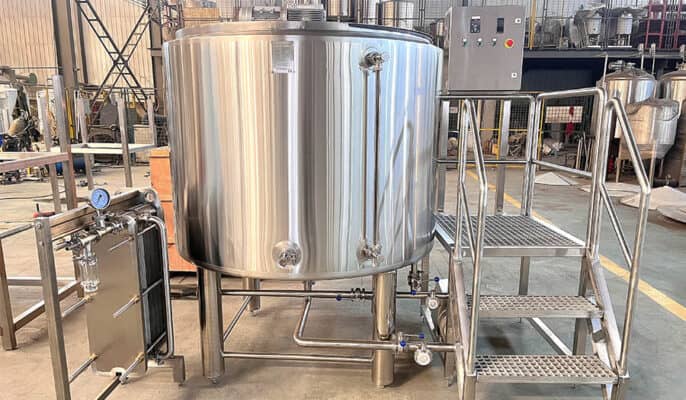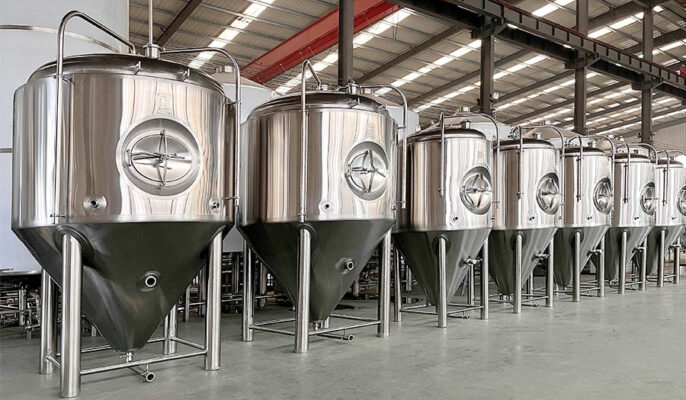When purchasing a kombucha fermenter, some key tips will not only ensure that you get a high-quality product but will also make your kombucha-making journey smoother and more efficient. Although kombucha has been around for thousands of years, it has only begun to grow in recent years. The world is realizing the health benefits of this flavorful probiotic beverage. With people wanting to be healthier and consuming organic products more and more, now is the perfect time to get into the kombucha brewing industry.
What is Kombucha?
Kombucha is initially a sugary tea that is then fermented with the help of a bacterial membrane. “SCOBY” is an acronym for “Symbiotic Culture of Bacteria and Yeast”. It is very similar to the parent bacteria used to make vinegar.
The SCOBY bacteria and yeast eat most of the sugar in the tea, turning it into a refreshingly sparkling, slightly tart fermented beverage (but essentially non-alcoholic) that is relatively low in calories and sugar.

Types of Kombucha Fermentation Tanks
Ceramic Fermentation Tanks
Ceramic fermentation tanks are known for their good thermal insulation and suitability for tea fermentation. They usually maintain stable temperature and humidity, which helps the tea reach its ideal state during the fermentation process. Suitable for long fermentation processes, such as teas such as Kombucha that require a long time for microbial fermentation.
Roestvrijstalen fermentatietanks
Stainless steel fermentation tanks have excellent durability and easy cleaning and are usually easier to maintain and manage than ceramic tanks. They also typically have good sealing properties. Suitable for tea processing that requires temperature and humidity control, short-term fermentation, or industrial production.
Wooden Fermentation Tanks
Wooden fermentation tanks are generally made of natural wood, and sometimes bamboo. They sometimes carry natural microorganisms, which may have a certain impact on the fermentation of some teas. Mainly suitable for certain types of tea, such as some traditional Pu’er tea fermentation processes that use wooden fermentation tanks.
Advantages of Using a Stainless Steel Kombucha Fermenter
- Durability and Longevity: Stainless steel is a very durable material that can withstand high temperatures and pressures, making it a great choice for fermenters. Stainless steel fermenters can last for many years as long as they are properly maintained. This means you only have to invest in a quality fermenter once and you can enjoy its benefits for a long time.
- Easy to Clean and Sanitize: One of the biggest advantages of stainless steel fermenters is that they are easy to clean and sanitize. Stainless steel is non-porous, which means it is resistant to bacteria and other microorganisms. This makes it easy to clean the fermenter before and after each use. You can use non-abrasive cleaners and sanitizers to avoid damaging the stainless steel.
- Temperature Control: During the fermentation process, temperature control is critical. Stainless steel has excellent thermal conductivity, which means it can maintain a consistent temperature throughout the fermentation process. This is very important for producing high-quality beer. Some fermenters even have a double-layer design with an outer jacket that can precisely control the temperature.
- Made of high-quality 304 stainless steel, hygienic welds, and connections help prevent harmful bacteria from destroying your SCOBY.
Het juiste kiezen Kombucha Fermenter
When choosing a fermenter for kombucha brewing, it’s important to select a vessel that is food-safe, easy to clean, and large enough to hold your brewing volume. Many beer brewing fermenters meet these requirements and can be repurposed for kombucha brewing.
A popular choice for a kombucha fermenter is a glass carboy. Glass is non-reactive and doesn’t absorb flavors or odors, making it ideal for fermenting kombucha. Additionally, glass allows you to visually monitor the fermentation process, which can be both educational and satisfying.
Another option is a stainless steel fermenter. Stainless steel is durable, easy to clean, and resistant to scratches and dents. It’s also non-reactive, ensuring that no unwanted flavors or chemicals will seep into your kombucha. Stainless steel fermenters often come with an airtight seal to help maintain a stable fermentation environment.
Whatever fermenter you choose, make sure it has a wide opening or a removable lid. This makes it easier to add and remove ingredients and thoroughly clean the container.


Tips for Buying a Kombucha Fermentation Tank
- Material and manufacturing quality: Kombucha fermentation tanks are usually made of ceramic or stainless steel. Ceramic tanks help maintain a constant temperature and humidity, which is conducive to the fermentation of tea. Stainless steel tanks are easier to clean and maintain, but may not be as suitable for long-term fermentation as ceramic.
- Capacity: Choose the appropriate capacity based on the amount of tea you usually handle. The capacity of fermentation tanks generally ranges from a few kilograms to more than ten kilograms. Choosing a fermentation tank with a moderate capacity will help keep the tea fermented evenly.
- Design features: Some kombucha fermentation tanks are designed with built-in temperature and humidity control systems. These systems can help you control the fermentation process more accurately. If you are a tea professional or want more sophisticated fermentation control, it may be a good idea to consider these features.
- Price and brand: Kombucha fermentation tanks from different brands vary greatly in price, and the quality and functions also vary. Choosing well-known brands and products with a good reputation is usually more reliable. Although the price may be higher, the quality is more guaranteed in the long run.
- User reviews and suggestions: It is important to check the reviews and suggestions of other users before purchasing. Their experience can help you avoid potential problems and also educate you on the pros and cons of specific brands or models.
Micet Group offers batch and continuous fermentation systems that are perfect for commercial kombucha production. We specialize in ensuring temperature control, with sanitary thermowells with thermometers, butterfly valves for easy cleaning and maintenance, and commercial Cleaning-in-Place (CIP) systems for easy cleaning. Some of our fermenters come with heavy-duty casters and wheels to make your SCOBY easy to move. With a tank designed specifically for fermenting kombucha, you’ll be able to effectively manage the symbiotic relationship of your yeast and bacterial cultures.




